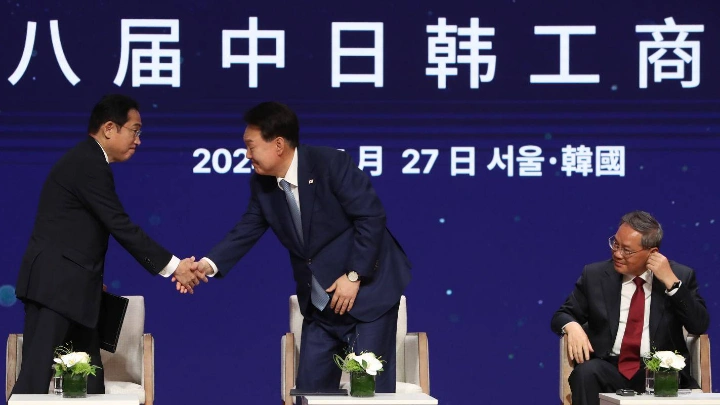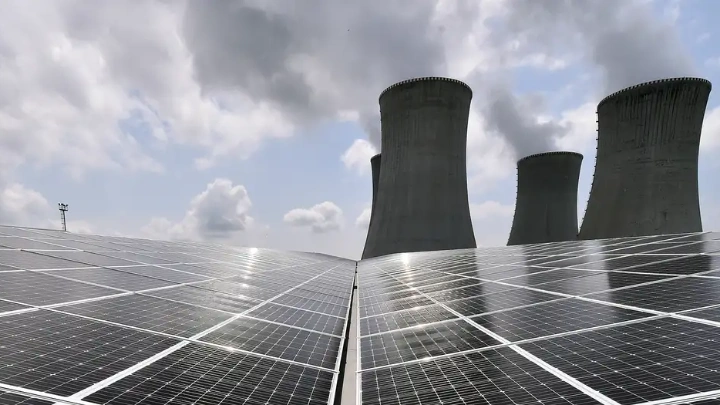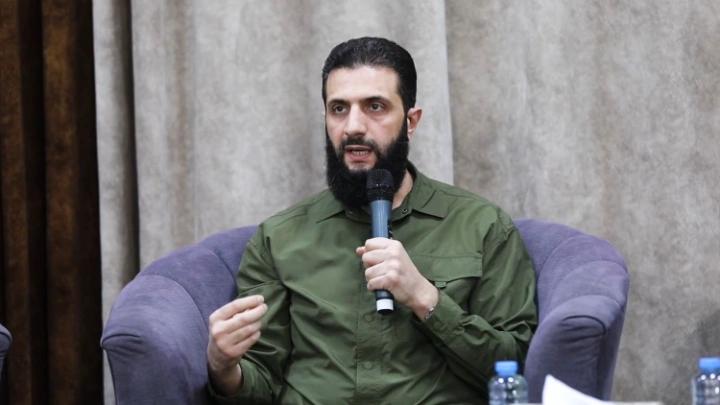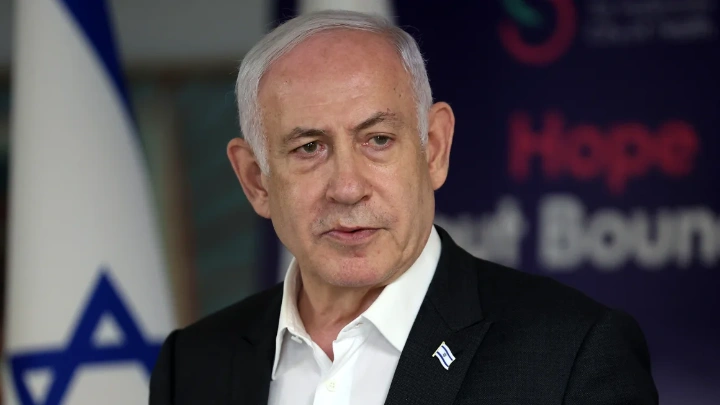China, Japan and South Korea have held their first trilateral summit in nearly five years. But amid the positive noises, distrust remains.
Landmark summit brings little progress on regional security in northeast Asia
Dr Edward Howell, Chatham House || Shining BD
The trilateral summit in Seoul on 27 May between China, Japan, and South Korea underscores both the urgency and challenges in adopting a common approach towards regional security concerns in northeast Asia. That the summit took place at all was an achievement, given the heightened regional and global geopolitical crises.
While the summit’s joint statement demonstrated agreement on the need to promote people-to-people exchanges, sustainable development, economic trade, and public health, progress on thornier questions of military security and foreign policy remains stagnant. The absence of the Chinese president, Xi Jinping, further limited chances for movement.
The previous summit had been in 2019, followed by a nearly five-year hiatus marked by the COVID-19 pandemic and various unresolved bilateral disputes between Seoul and Tokyo as well as Seoul and Beijing.
Although the Chinese premier, Li Qiang, hailed the May summit as ‘a restart’ of cooperative relations, distrust between China and the US’s allies of South Korea and Japan is likely to continue, particularly on issues such as North Korea’s denuclearization.
Competing interests and domestic politics
Expectations of the three-party summit were dampened even before it began by a series of bilateral meetings held shortly before. The meetings brought to the fore competing state interests amid the constraints of domestic politics and increased tensions between China and the US.
With respect to the latter, for instance, the Chinese foreign minister, Wang Yi, accused South Korea earlier in May of supporting Taiwanese independence and denied China’s involvement in the forced repatriation of North Korean defectors in China.
Meanwhile, the proactive approach of South Korea’s President Yoon Suk Yeol towards easing his country’s tumultuous relations with Japan has borne fruit on a bilateral level but left him with problems at home.
Competing interests and domestic politics
Expectations of the three-party summit were dampened even before it began by a series of bilateral meetings held shortly before. The meetings brought to the fore competing state interests amid the constraints of domestic politics and increased tensions between China and the US.
With respect to the latter, for instance, the Chinese foreign minister, Wang Yi, accused South Korea earlier in May of supporting Taiwanese independence and denied China’s involvement in the forced repatriation of North Korean defectors in China.
Meanwhile, the proactive approach of South Korea’s President Yoon Suk Yeol towards easing his country’s tumultuous relations with Japan has borne fruit on a bilateral level but left him with problems at home.
Yoon’s outreach towards Japan has attracted fierce domestic criticism from the opposition Democratic Party.
In March 2023, Yoon met the Japanese prime minister, Fumio Kishida, in Tokyo, marking the first time in 12 years that any South Korean leader had been invited to meet their Japanese counterpart.
In April this year, too, the two leaders pledged to ‘open up a new era of cooperation’ in the face of North Korea’s repeated missile launches. The May bilateral meeting between Kishida and Yoon underscored how the two states are aligned on the need to strengthen cooperation with the US to address ongoing North Korean nuclear and human rights issues and contain China’s aggressive posture towards Taiwan.
Nevertheless, Yoon’s outreach towards Japan has attracted fierce domestic criticism from the opposition Democratic Party. It currently dominates South Korea’s National Assembly after Yoon’s People Power Party suffered a significant defeat in legislative elections in April.
A week before the trilateral summit, relations were tested following a spat in which lawmakers in Seoul accused Japan of pressurizing a South Korean company to sell its stake in LY Corporation, a joint venture between South Korean and Japanese technological firms.
Balancing economic and security needs
Although the three states agreed to implement the Regional Comprehensive Economic Partnership and accelerate negotiations towards a tripartite free-trade agreement, any such talks are likely to be far from plain sailing given the conflicting security interests.
Seoul and Tokyo are both caught between maintaining robust security ties with the US and balancing the fact that China is their largest trading partner.
China is dissatisfied with the involvement of South Korea and Japan in US-led initiatives such as the ‘Chip 4 Alliance’ – involving South Korea, Japan, Taiwan and the US – which seeks to weaken China’s role in semiconductor supply chains.
Moreover, Premier Li’s reluctance to elaborate on the Taiwan issue at the trilateral summit is in keeping with Chinese criticism of the recent visit by Japanese and South Korean officials to the inauguration ceremony of Taiwanese president, Lai Ching-te.
For their part, Seoul and Tokyo are both caught between maintaining robust security ties with the US and balancing the fact that China is their largest trading partner. They have hitherto been cautious about actively criticizing China and Russia, for fear of damaging their economic ties.
Moving forward, however, Seoul and Tokyo must not be afraid to call out actions by states that oppose the values of freedom, peace, and prosperity within the US-led liberal international order.
Indeed, doing so would be firmly in line with President Yoon’s vision of South Korea becoming a ‘global pivotal state’. Seoul should also not be deterred from pursuing its recent expression of interest in joining Pillar II of the AUKUS security pact, which reinforces its role as a provider – not just a consumer – of regional security.
Differences over North Korea
The North Korean nuclear issue remains unresolved. Hours after the summit, North Korea conducted a failed launch of a rocket carrying a spy satellite over the Yellow Sea, having criticized the discussion of denuclearization as a ‘grave political provocation’.
Beijing is likely to continue voicing opposition to the enforcement of UN Security Council sanctions on Pyongyang.
The leaders of the three states reiterated their commitment to promoting peace and stability on the Korean Peninsula. Yet, the ambiguity of this pledge only underscored the divergences between the approaches of China towards North Korea’s denuclearization, and those of South Korea and Japan.
Beijing is likely to continue voicing opposition to the enforcement of UN Security Council sanctions on Pyongyang, and will seek to maintain the status quo on the Korean Peninsula, particularly in light of its role in aiding North Korea’s evasion of UN sanctions.
South Korea and Japan are likely to be increasingly concerned with Russia’s growing ties with China, as well as North Korea, as the war in Ukraine continues. In the face of common threats, Seoul and Tokyo should seek to overcome bilateral differences, and strengthen bilateral and trilateral cooperation with the US, such as through engaging in joint military exercises.
Although the May trilateral summit was only one small step in fostering cooperation between China, Japan, and South Korea, it is worth remembering that this year marks a rare occasion when the three states are concurrently serving on the UN Security Council, with Japan and South Korea as observer members.
Despite the UN Security Council’s paralysed nature, it is vital that dialogue between Beijing, Moscow, and Seoul continues, and that the US reiterates its commitment to its allies of Japan and South Korea – even if progress on resolving regional security issues may be slow.
Shining BD
























